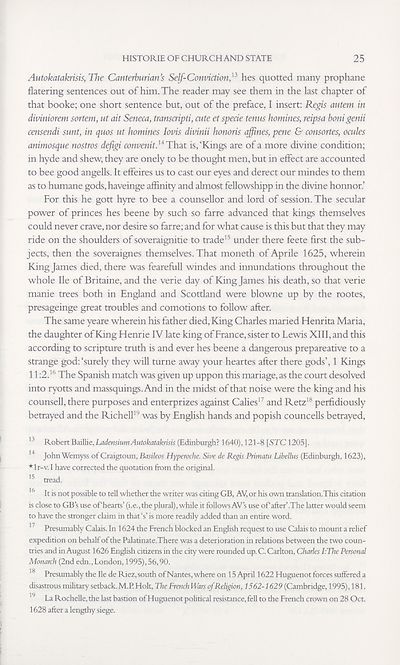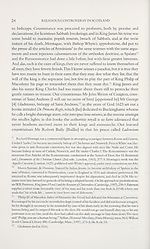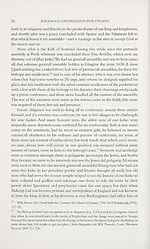Series 5 > Religious Controversy in Scotland 1625-1639
(40) Page 25
Download files
Complete book:
Individual page:
Thumbnail gallery: Grid view | List view

HISTORIE OF CHURCH AND STATE
25
Autokatakrisis, The Canterburian’s Self-Conviction,'3 hes quotted many prophane
flatering sentences out of him. The reader may see them in the last chapter of
that booke; one short sentence but, out of the preface, I insert: Regis autem in
diviniorem sortem, ut ait Seneca, transcripti, cute et specie tenus homines, reipsa bonigenii
censendi sunt, in quos ut homines lovis divinii honoris affmes, pene & consortes, ocules
animosque nostros dejigi convenitT That is,‘Kings are of a more divine condition;
in hyde and shew, they are onely to be thought men, but in effect are accounted
to bee good angells. It effeires us to cast our eyes and derect our mindes to them
as to humane gods,haveinge affinity and almost fellowshipp in the divine honnor.’
For this he gott hyre to bee a counsellor and lord of session. The secular
power of princes hes beene by such so farre advanced that kings themselves
could never crave, nor desire so farre; and for what cause is this but that they may
ride on the shoulders of soveraignitie to trade15 under there feete first the sub¬
jects, then the soveraignes themselves. That moneth of Aprile 1625, wherein
King James died, there was fearefull windes and innundations throughout the
whole He of Britaine, and the verie day of King James his death, so that verie
manie trees both in England and Scottland were blowne up by the rootes,
presageinge great troubles and comotions to follow after.
The same yeare wherein his father died, King Charles maried Henrita Maria,
the daughter of King Henrie IV late king of France, sister to Lewis XIII, and this
according to scripture truth is and ever hes beene a dangerous prepareative to a
strange god:‘surely they will turne away your heartes after there gods’, 1 Kings
11:2.16 The Spanish match was given up uppon this manage, as the court desolved
into ryotts and massquings. And in the midst of that noise were the king and his
counsell, there purposes and enterprizes against Calies17 and Retz18 perfidiously
betrayed and the Richell19 was by English hands and popish councells betrayed,
13 Robert Baillie,Ladensium Autokatakrisis (Edinburgh? 1640), 121-8 [STC1205].
14 John Wemyss of Craigtoun, Basileos Hyperoche. Sive de Regis Primatu Ubellus (Edinburgh, 1623),
*lr-v. I have corrected the quotation from the original.
15 tread.
It is not possible to tell whether the writer was citing GB, AV, or his own translation.This citation
is close to GB’s use ofhearts’ (i.e., the plural), while it follows AV’s use of after’.The latter would seem
to have the stronger claim in that's’ is more readily added than an entire word.
17 Presumably Calais. In 1624 the French blocked an English request to use Calais to mount a relief
expedition on behalf of the Palatinate.There was a deterioration in relations between the two coun¬
tries and in August 1626 English citizens in the city were rounded up. C. Carlton, Charles I:The Personal
Monarch (2nd edn.,London, 1995), 56,90.
18 Presumably the He de Riez, south of Nantes, where on 15 April 1622 Huguenot forces suffered a
disastrous military setback. M.P. Holt, The French Wars of Religion, 1562-1629 (Cambridge, 1995), 181.
19 La Rochelle, the last bastion of Huguenot political resistance, fell to the French crown on 28 Oct.
1628 after a lengthy siege.
25
Autokatakrisis, The Canterburian’s Self-Conviction,'3 hes quotted many prophane
flatering sentences out of him. The reader may see them in the last chapter of
that booke; one short sentence but, out of the preface, I insert: Regis autem in
diviniorem sortem, ut ait Seneca, transcripti, cute et specie tenus homines, reipsa bonigenii
censendi sunt, in quos ut homines lovis divinii honoris affmes, pene & consortes, ocules
animosque nostros dejigi convenitT That is,‘Kings are of a more divine condition;
in hyde and shew, they are onely to be thought men, but in effect are accounted
to bee good angells. It effeires us to cast our eyes and derect our mindes to them
as to humane gods,haveinge affinity and almost fellowshipp in the divine honnor.’
For this he gott hyre to bee a counsellor and lord of session. The secular
power of princes hes beene by such so farre advanced that kings themselves
could never crave, nor desire so farre; and for what cause is this but that they may
ride on the shoulders of soveraignitie to trade15 under there feete first the sub¬
jects, then the soveraignes themselves. That moneth of Aprile 1625, wherein
King James died, there was fearefull windes and innundations throughout the
whole He of Britaine, and the verie day of King James his death, so that verie
manie trees both in England and Scottland were blowne up by the rootes,
presageinge great troubles and comotions to follow after.
The same yeare wherein his father died, King Charles maried Henrita Maria,
the daughter of King Henrie IV late king of France, sister to Lewis XIII, and this
according to scripture truth is and ever hes beene a dangerous prepareative to a
strange god:‘surely they will turne away your heartes after there gods’, 1 Kings
11:2.16 The Spanish match was given up uppon this manage, as the court desolved
into ryotts and massquings. And in the midst of that noise were the king and his
counsell, there purposes and enterprizes against Calies17 and Retz18 perfidiously
betrayed and the Richell19 was by English hands and popish councells betrayed,
13 Robert Baillie,Ladensium Autokatakrisis (Edinburgh? 1640), 121-8 [STC1205].
14 John Wemyss of Craigtoun, Basileos Hyperoche. Sive de Regis Primatu Ubellus (Edinburgh, 1623),
*lr-v. I have corrected the quotation from the original.
15 tread.
It is not possible to tell whether the writer was citing GB, AV, or his own translation.This citation
is close to GB’s use ofhearts’ (i.e., the plural), while it follows AV’s use of after’.The latter would seem
to have the stronger claim in that's’ is more readily added than an entire word.
17 Presumably Calais. In 1624 the French blocked an English request to use Calais to mount a relief
expedition on behalf of the Palatinate.There was a deterioration in relations between the two coun¬
tries and in August 1626 English citizens in the city were rounded up. C. Carlton, Charles I:The Personal
Monarch (2nd edn.,London, 1995), 56,90.
18 Presumably the He de Riez, south of Nantes, where on 15 April 1622 Huguenot forces suffered a
disastrous military setback. M.P. Holt, The French Wars of Religion, 1562-1629 (Cambridge, 1995), 181.
19 La Rochelle, the last bastion of Huguenot political resistance, fell to the French crown on 28 Oct.
1628 after a lengthy siege.
Set display mode to:
![]() Universal Viewer |
Universal Viewer | ![]() Mirador |
Large image | Transcription
Mirador |
Large image | Transcription
Images and transcriptions on this page, including medium image downloads, may be used under the Creative Commons Attribution 4.0 International Licence unless otherwise stated. ![]()
| Scottish History Society volumes > Series 5 > Religious Controversy in Scotland 1625-1639 > (40) Page 25 |
|---|
| Permanent URL | https://digital.nls.uk/127328445 |
|---|
| Description | Over 180 volumes, published by the Scottish History Society, containing original sources on Scotland's history and people. With a wide range of subjects, the books collectively cover all periods from the 12th to 20th centuries, and reflect changing trends in Scottish history. Sources are accompanied by scholarly interpretation, references and bibliographies. Volumes are usually published annually, and more digitised volumes will be added as they become available. |
|---|


